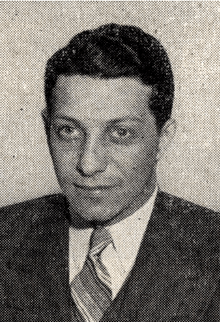Samuel Rose (Philadelphia)

Samuel Rose (August 11, 1911 – January 31, 1960) was a Democratic lawyer and politician from Philadelphia.
Rose was born in 1911 in Philadelphia, the son of Issac Louis Rose and Minnie Mutterpearl Rose.[1][2] Raised in West Philadelphia, he attended Overbrook High School before graduating from the University of Pennsylvania and Temple University Law School.[3] In 1940, he married Rosalie Abrams, with whom he would have two children.[1] After law school, he worked as an assistant examiner at the Pennsylvania Public Utility Commission before starting a private law practice with an office in the Market Street Bank Building in Center City Philadelphia.[4][3] He also worked as a part-time boxing promoter.[4]
Rose quickly got involved in local politics as a Democrat, becoming leader of the 24th ward.[3] He was elected to the Pennsylvania House of Representatives as one of three members from the 18th district, along with fellow Democrats Marshall L. Shepard and John J. Finnerty.[5] (House members at that time were chosen from multimember districts.) In 1942, despite Republican gains statewide, Rose and Finnerty were reelected along with Democrat Dennis W. Hoggard.[6] Two years later, the voters elected all three representatives to another term.[7] In 1946, the Republicans swept the city and much of the state including Rose's district as he and his co-members went down to defeat.[8] Two years later the Democrats regained some of their losses, including electing Rose, Hoggard, and Edward J. Conway from the 18th district, but Republicans still controlled the House.[9] All three were reelected in 1950, despite Republican gains elsewhere in the state.[10]
In 1951, Rose was elected to Philadelphia City Council from West Philadelphia's 4th district, part of a Democratic wave that swept the Republicans from power for the first time in 67 years.[11] He was appointed head of the Law and Government Committee.[12] In 1954, he joined with other reformers to successfully oppose the efforts fellow Democrats James Hugh Joseph Tate and Michael J. Towey to weaken the civil service reforms of the new charter.[13] The following year, he was reelected with an increased majority of 68%.[14] After his reelection, he was elected majority leader.[3] Rose changed course and joined with Tate in proposing similar amendments to the charter in 1956.[15] The proposals made it on to the April ballot but were defeated by the voters.[16]
Rose suffered a heart attack in April 1959, but recovered enough to win reelection that year.[3] His ailment persisted, however, and he died on January 31, 1960, at the age of 48.[3] Rose was buried at Roosevelt Memorial Park in Trevose, Pennsylvania.[2]
References
Sources
- "City Democrats Boost Assembly Bloc, 2 to 27". Philadelphia Inquirer. November 3, 1948. p. 6 – via Newspapers.com.
- "City Vote for State Representative". Philadelphia Inquirer. November 6, 1940. p. 17 – via Newspapers.com.
- "City Vote for State Representative". Philadelphia Inquirer. November 4, 1942. p. 25 – via Newspapers.com.
- "Dallas Loses by 457, Party's Lone Casualty". Philadelphia Inquirer. November 9, 1955. p. 1 – via Newspapers.com.
- "Death certificate". Ancestry.com. Retrieved October 22, 2016.
- Feist, William F. (January 11, 1952). "Setup of Committees Revamped By Council". Philadelphia Inquirer. p. 50 – via Newspapers.com.
- Lush, Gerson H. (November 6, 1946). "GOP Strengthens Grip on Penna. Legislature". Philadelphia Inquirer. p. 3 – via Newspapers.com.
- Miller, Joseph H. (February 18, 1954). "Council Unit OKs 6-Point Plan to 'Wreck' Charter". Philadelphia Inquirer. p. 1 – via Newspapers.com.
- "Penna. House Vote by Ward". Philadelphia Inquirer. November 8, 1944. p. 4 – via Newspapers.com.
- "Samuel Rose". Historical Biographies. Pennsylvania House of Representatives. 2016. Retrieved October 22, 2016.
- "Samuel Rose Dies; Councilman Was 48". Philadelphia Inquirer. February 1, 1960. p. 7 – via Newspapers.com.
- Schraga, Saul (February 24, 1956a). "Council Puts Ripper Up In Primary". Philadelphia Inquirer. p. 1, 11 – via Newspapers.com.
- Schraga, Saul (April 25, 1956b). "Voters Beat Proposal To Rip Up Charter". Philadelphia Inquirer. p. 1, 4 – via Newspapers.com.
- "3 Republican State Senators Upset in Phila. Vote". Philadelphia Inquirer. November 8, 1950. p. 2 – via Newspapers.com.
- "Virginia marriage record". Ancestry.com. Retrieved October 22, 2016.
- "Woman Elected to First Seat in City Council". Philadelphia Inquirer. November 7, 1951. p. 2 – via Newspapers.com.